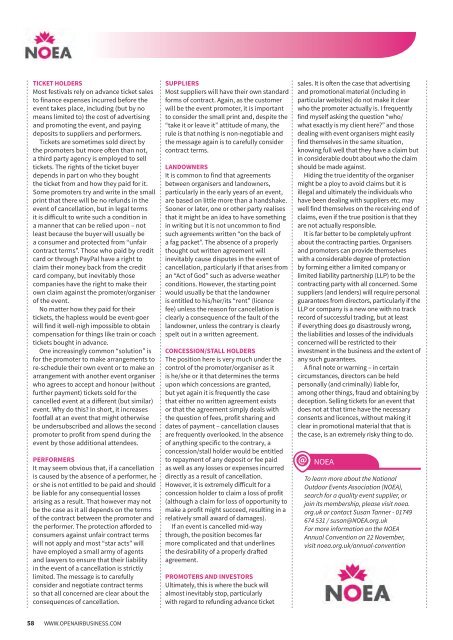Open Air Business June/July 2018
The UK's outdoor hospitality business magazine for function venues, glamping, festivals and outdoor events
The UK's outdoor hospitality business magazine for function venues, glamping, festivals and outdoor events
You also want an ePaper? Increase the reach of your titles
YUMPU automatically turns print PDFs into web optimized ePapers that Google loves.
TICKET HOLDERS<br />
Most festivals rely on advance ticket sales<br />
to finance expenses incurred before the<br />
event takes place, including (but by no<br />
means limited to) the cost of advertising<br />
and promoting the event, and paying<br />
deposits to suppliers and performers.<br />
Tickets are sometimes sold direct by<br />
the promoters but more often than not,<br />
a third party agency is employed to sell<br />
tickets. The rights of the ticket buyer<br />
depends in part on who they bought<br />
the ticket from and how they paid for it.<br />
Some promoters try and write in the small<br />
print that there will be no refunds in the<br />
event of cancellation, but in legal terms<br />
it is difficult to write such a condition in<br />
a manner that can be relied upon – not<br />
least because the buyer will usually be<br />
a consumer and protected from “unfair<br />
contract terms”. Those who paid by credit<br />
card or through PayPal have a right to<br />
claim their money back from the credit<br />
card company, but inevitably those<br />
companies have the right to make their<br />
own claim against the promoter/organiser<br />
of the event.<br />
No matter how they paid for their<br />
tickets, the hapless would be event-goer<br />
will find it well-nigh impossible to obtain<br />
compensation for things like train or coach<br />
tickets bought in advance.<br />
One increasingly common “solution” is<br />
for the promoter to make arrangements to<br />
re-schedule their own event or to make an<br />
arrangement with another event organiser<br />
who agrees to accept and honour (without<br />
further payment) tickets sold for the<br />
cancelled event at a different (but similar)<br />
event. Why do this? In short, it increases<br />
footfall at an event that might otherwise<br />
be undersubscribed and allows the second<br />
promoter to profit from spend during the<br />
event by those additional attendees.<br />
PERFORMERS<br />
It may seem obvious that, if a cancellation<br />
is caused by the absence of a performer, he<br />
or she is not entitled to be paid and should<br />
be liable for any consequential losses<br />
arising as a result. That however may not<br />
be the case as it all depends on the terms<br />
of the contract between the promoter and<br />
the performer. The protection afforded to<br />
consumers against unfair contract terms<br />
will not apply and most “star acts” will<br />
have employed a small army of agents<br />
and lawyers to ensure that their liability<br />
in the event of a cancellation is strictly<br />
limited. The message is to carefully<br />
consider and negotiate contract terms<br />
so that all concerned are clear about the<br />
consequences of cancellation.<br />
SUPPLIERS<br />
Most suppliers will have their own standard<br />
forms of contract. Again, as the customer<br />
will be the event promoter, it is important<br />
to consider the small print and, despite the<br />
“take it or leave it” attitude of many, the<br />
rule is that nothing is non-negotiable and<br />
the message again is to carefully consider<br />
contract terms.<br />
LANDOWNERS<br />
It is common to find that agreements<br />
between organisers and landowners,<br />
particularly in the early years of an event,<br />
are based on little more than a handshake.<br />
Sooner or later, one or other party realises<br />
that it might be an idea to have something<br />
in writing but it is not uncommon to find<br />
such agreements written “on the back of<br />
a fag packet”. The absence of a properly<br />
thought out written agreement will<br />
inevitably cause disputes in the event of<br />
cancellation, particularly if that arises from<br />
an “Act of God” such as adverse weather<br />
conditions. However, the starting point<br />
would usually be that the landowner<br />
is entitled to his/her/its “rent” (licence<br />
fee) unless the reason for cancellation is<br />
clearly a consequence of the fault of the<br />
landowner, unless the contrary is clearly<br />
spelt out in a written agreement.<br />
CONCESSION/STALL HOLDERS<br />
The position here is very much under the<br />
control of the promoter/organiser as it<br />
is he/she or it that determines the terms<br />
upon which concessions are granted,<br />
but yet again it is frequently the case<br />
that either no written agreement exists<br />
or that the agreement simply deals with<br />
the question of fees, profit sharing and<br />
dates of payment – cancellation clauses<br />
are frequently overlooked. In the absence<br />
of anything specific to the contrary, a<br />
concession/stall holder would be entitled<br />
to repayment of any deposit or fee paid<br />
as well as any losses or expenses incurred<br />
directly as a result of cancellation.<br />
However, it is extremely difficult for a<br />
concession holder to claim a loss of profit<br />
(although a claim for loss of opportunity to<br />
make a profit might succeed, resulting in a<br />
relatively small award of damages).<br />
If an event is cancelled mid-way<br />
through, the position becomes far<br />
more complicated and that underlines<br />
the desirability of a properly drafted<br />
agreement.<br />
PROMOTERS AND INVESTORS<br />
Ultimately, this is where the buck will<br />
almost inevitably stop, particularly<br />
with regard to refunding advance ticket<br />
sales. It is often the case that advertising<br />
and promotional material (including in<br />
particular websites) do not make it clear<br />
who the promoter actually is. I frequently<br />
find myself asking the question “who/<br />
what exactly is my client here?” and those<br />
dealing with event organisers might easily<br />
find themselves in the same situation,<br />
knowing full well that they have a claim but<br />
in considerable doubt about who the claim<br />
should be made against.<br />
Hiding the true identity of the organiser<br />
might be a ploy to avoid claims but it is<br />
illegal and ultimately the individuals who<br />
have been dealing with suppliers etc. may<br />
well find themselves on the receiving end of<br />
claims, even if the true position is that they<br />
are not actually responsible.<br />
It is far better to be completely upfront<br />
about the contracting parties. Organisers<br />
and promoters can provide themselves<br />
with a considerable degree of protection<br />
by forming either a limited company or<br />
limited liability partnership (LLP) to be the<br />
contracting party with all concerned. Some<br />
suppliers (and lenders) will require personal<br />
guarantees from directors, particularly if the<br />
LLP or company is a new one with no track<br />
record of successful trading, but at least<br />
if everything does go disastrously wrong,<br />
the liabilities and losses of the individuals<br />
concerned will be restricted to their<br />
investment in the business and the extent of<br />
any such guarantees.<br />
A final note or warning – in certain<br />
circumstances, directors can be held<br />
personally (and criminally) liable for,<br />
among other things, fraud and obtaining by<br />
deception. Selling tickets for an event that<br />
does not at that time have the necessary<br />
consents and licences, without making it<br />
clear in promotional material that that is<br />
the case, is an extremely risky thing to do.<br />
NOEA<br />
To learn more about the National<br />
Outdoor Events Association (NOEA),<br />
search for a quality event supplier, or<br />
join its membership, please visit noea.<br />
org.uk or contact Susan Tanner - 01749<br />
674 531 / susan@NOEA.org.uk<br />
For more information on the NOEA<br />
Annual Convention on 22 November,<br />
visit noea.org.uk/annual-convention<br />
58 WWW.OPENAIRBUSINESS.COM


















